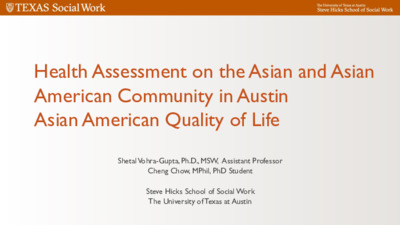Item 3 - Health Assessment Presentation UT Austin — original pdf
Backup

Health Assessment on the Asian and Asian American Community in Austin Asian American Quality of Life Shetal Vohra-Gupta, Ph.D., MSW, Assistant Professor Cheng Chow, MPhil, PhD Student Steve Hicks School of Social Work The University of Texas at Austin Chinese Americans: 24% (5.4 million) Indian Americans: 21% (4.6 million) Filipinos:19% (4.2 million) Roots in Vietnam (2.2 million), Korea (1.9 million) and Japan (1.5 million) each have a population of at least 1 million. Asian population is on the rise in Texas The number of Asian Americans in Texas increased by 91,921 people from 2022 to 2023, amounting to over 1.7 million people in total. The fastest growing numbers were in the Austin-Round Rock-San Marcos metro area, with 10.5% increase from 2022 to 2023 – First among U.S. metro areas. Source: U.S. Census Bureau Credit: Elijah Nicholson-Messmer Older age groups – the sharpest increase Social services? Healthcare access? Affordability? Chronic health conditions? Caregiver resources? Transportation? Social isolation? Support infrastructure? Source: U.S. Census Bureau Credit: Elijah Nicholson-Messmer Diversity of Asian population in Austin Ethnicity Total Asian Asian Indian Chinese Vietnamese Korean Filipino Pakistani Taiwanese Japanese Nepalese Two or more Asian groups Population 80,245 30,361 15,246 9,659 6,738 4,790 2,135 1,943 1,507 1,412 1,344 1,212 Share 100.0% 37.8% 19.0% 12.0% 8.4% 6.0% 2.7% 2.4% 1.9% 1.8% 1.7% Other Central Asian 1.5% Source: U.S. Census Bureau American Community Survey 2022 5-Year Estimates Asian American Health Assessment Health issues identified Obesity, Diabetes, Heart Disease, Cancer, Hepatitis B, Tuberculosis, Behavioral Health, Healthcare Access Barriers Recommendations suggested Improve OUTREACH to subpopulations Focus on PREVENTION Increase ACCESS to health care Provide CULTURALLY SENSITIVE health care Asian American Quality of Life Survey Asian American Quality of Life Survey Major findings (N=2,609) • A majority of the survey participants (90.8%) were foreign-born immigrants • More than 28% of the overall sample had at least one chronic disease • Tobacco use more prevalent among Korean and Vietnamese while Koreans and Filipinos were least likely to engage in physical exercise and a healthy diet. • More than 11% reported an experience of unmet health care needs during the past 12 months (particularly in Koreans [15.4%] and Vietnamese [17.1%]) -inconsistent with the findings from national data (2.8% among Asians) • 20% of the sample reported the need for transportation and interpretation (particularly high in Koreans [29.5%], Chinese [24.0%], and Vietnamese [22.4%]) • The prevalence of mental distress and serve mental illness was 44.2% and 6.1% versus national data (18% and 3%, respectively) while only about 5% of the overall sample had received treatment from mental health professionals Gaps and moving forward • • • • Changed population dynamics The lack of detailed and up-to-date information Evolved landscape of health services after COVID-19 • What are the prevalent mental health conditions? • What are the barriers to care within and across Asian subgroups ? How about the influence of socio-cultural factors? Asian Americans remain one of the least understood populations in terms of health needs https://www.texastribune.org/2024/06/26/texas-asian-american-growth-census/ Proposed project – A pilot study • Identify primary health concerns and barriers to healthcare access among Asian Americans in Austin through a health needs assessment based on the social determinants of health framework. • Develop and pilot an updated Asian American Quality of Life (AAQoL) survey to capture health disparities, barriers to care, and cultural factors affecting healthcare access for ongoing assessment. Stage 1 Qualitative: Interviews with key informants and community members Stage II Quantitative: An updated AAQoL survey among community members Large- scale studies Interventions Policy advocacy https://www.cde.state.co.us/equitytoolkit/intersectionality Proposed project – A pilot study Stage I Qualitative: Interviews with key informants and community members Stage II Quantitative: An updated AAQoL survey among community members Large- scale studies Interventions Policy advocacy Target sample: 20 community members and five key informants Interview: structured, open-ended interview Sample questions • How has your experience as a [Asian subgroup] influenced how you navigate healthcare or access resources in Austin? • What challenges or supports have you encountered? • In what ways do you feel your cultural background or identity as a [Asian subgroup] has influenced how you deal with healthcare decisions in Austin? Have you noticed any changes in your health or well-being since moving to the Austin/U.S., compared to when you were originally ? • • What do you think might have contributed to these changes? Proposed project – A pilot study Stage I Qualitative: Interviews with key informants and community members Development: Findings from Stage1 to address emerging themes and variables specific to the current study population in Austin. Stage II Quantitative: An updated AAQoL survey among community members Target sample: 300 respondents disaggregated by ethnicity, age, English proficiency, immigration status etc. Large- scale studies Interventions Policy advocacy Sampling: site-based purposive sampling approach, targeting locations and events frequented by Asian American community members Proposed project – A pilot study Stage I Qualitative: Interviews with key informants and community members Stage II Quantitative: An updated AAQoL survey among community members Large- scale studies Interventions Policy advocacy Funding Application Funding source: The St. David’s Center for Health Promotion & Disease Prevention Research in Underserved Populations (St. David’s CHPR), School of Nursing, The University of Texas at Austin Funding amount: $25,000 Stage: letter of interest submitted & proposal invited Support: AARC What are possible funding resources? Thank You! Shetal Vohra-Gupta: sgupta@austin.utexas.edu Cheng Chow: chengchow@utexas.edu Steve Hicks School of Social Work The University of Texas at Austin